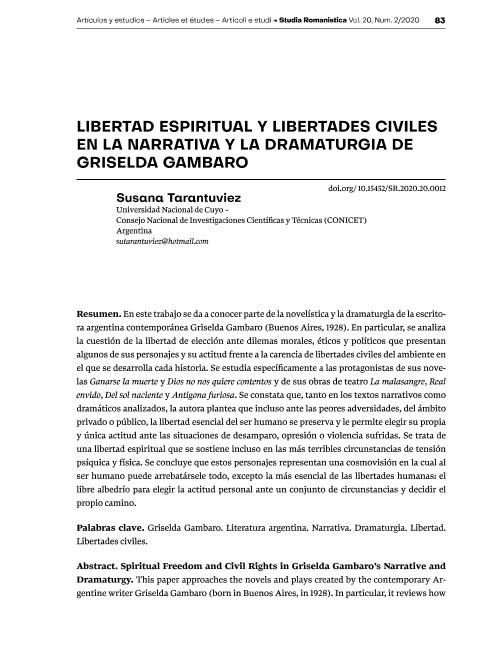Artículo
Este artículo aborda las novelas y obras de teatro creadas por la escritora argentina contemporánea Griselda Gambaro (nacida en Buenos Aires, en 1928). En particular, revisa cómo algunos de sus personajes abordan el tema de la libertad de elección frente a dilemas morales, éticos y políticos, así como su actitud ante la falta de derechos civiles en el contexto en el que se desarrolla cada historia. Los protagonistas de sus novelas Ganarse la muerte y Dios no nos quiere contentos, y de sus obras teatrales La malasangre, Real envido, Del sol naciente y Antígona furiosa son puestos en consideración. En estos textos narrativos y dramáticos, el autor argumenta que incluso ante las peores adversidades, en el ámbito privado o público, se preserva la libertad esencial del ser humano y le permite elegir su propia actitud única en situaciones de desamparo, opresión o violencia. Es una libertad espiritual que se sostiene incluso en las más terribles circunstancias de sufrimiento psíquico y físico. La conclusión es que estos personajes representan una cosmovisión en la que el ser humano puede ser privado de todo, excepto de la más esencial de las libertades humanas, que es el libre albedrío para elegir una actitud personal ante un conjunto de circunstancias y decidir su propio camino. This paper approaches the novels and plays created by the contemporary Ar‑ gentine writer Griselda Gambaro (born in Buenos Aires, in 1928). In particular, it reviews how some of her characters deal with the issue of freedom of choice in the face of moral, ethical and political dilemmas, as well as their attitude towards the lack of civil rights in the context in which each story takes place. The protagonists of her novels Ganarse la muerte and Dios no nos quiere contentos, and of her plays La malasangre, Real envido, Del sol naciente, and Antígona furiosa are put into close consideration. In these narrative and dramatic texts, the author argues that even in the face of the worst adversities, in the private or public sphere, the essential freedom of the human being is preserved and allows him/her to choose his/her own unique attitude in situations of helplessness, oppression or violence. It is a spiritual freedom that is sustai‑ ned even in the most terrible circumstances of psychic and physical suffering. The conclusion is that these characters represent a worldview in which the human being can be deprived of everything, except the most essential of human liberties, that is the free will to choose a perso‑ nal attitude to a set of circumstances and decide his/her own path.
Libertad espiritual y libertades civiles en la narrativa y la dramaturgia de Griselda Gambaro
Título:
Spiritual Freedom and Civil Rights in Griselda Gambaro’s Narrative and Dramaturgy
Fecha de publicación:
11/2020
Editorial:
University of Ostrava. Faculty of Arts. Department of Romance Studies
Revista:
Studia Romanistica
ISSN:
1803-6406
e-ISSN:
2571-0265
Idioma:
Español
Tipo de recurso:
Artículo publicado
Clasificación temática:
Resumen
Archivos asociados
Licencia
Identificadores
Colecciones
Articulos(CCT - MENDOZA)
Articulos de CTRO.CIENTIFICO TECNOL.CONICET - MENDOZA
Articulos de CTRO.CIENTIFICO TECNOL.CONICET - MENDOZA
Citación
Tarantuviez, Susana; Libertad espiritual y libertades civiles en la narrativa y la dramaturgia de Griselda Gambaro; University of Ostrava. Faculty of Arts. Department of Romance Studies; Studia Romanistica; 20; 2; 11-2020; 83-95
Compartir
Altmétricas




